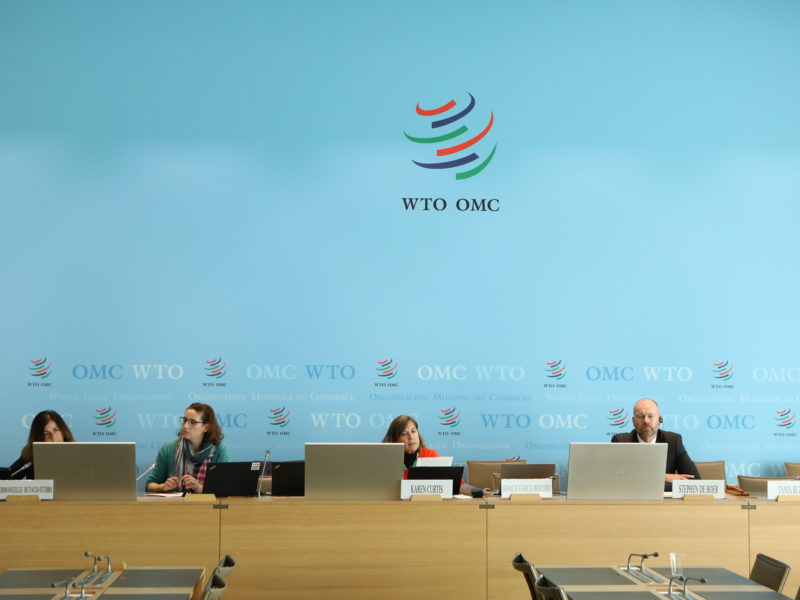Guest post by Stephanie Rickard
Protecting the environment is one of the most pressing issues countries face today. Yet, nations disagree over how to achieve this goal. In international fora, states often fail to coordinate on protecting the environment. For example, for two decades, countries at the World Trade Organization (WTO), unsuccessfully discussed how to protect the ocean’s biomass.
Governments spend $35 billion of taxpayers’ money annually on subsidies to support the fishing industry. Two-thirds of these subsidies directly contribute to overfishing—that is, fishing beyond environmentally sustainable limits. Yet, WTO member countries couldn’t agree on restrictions on environmentally-destructive fishing subsidies.
In the absence of a WTO agreement, many countries continued to provide subsidies that contributed to the depletion of global fish stocks. But not all. Some countries, like New Zealand, prioritized environmentally-friendly subsidies, including programs that offset the costs of determining sustainable catch limits. All of New Zealand’s general fisheries subsidies now go to “green” programs.
In contrast, the United Kingdom (UK) spends just 20 percent of its fisheries subsidies on green programs. The bulk of spending funds subsidies that reduce the costs of doing business, including subsidies for the purchase of vessels, fuel, and bait. These types of subsidies increase catch levels and can lead to overfishing. A subsidy scheme in force from 1982 until 2001 provided money to purchase a vessel for full-time fishing, thereby increasing the number of boats in the UK’s fishing fleet. Another subsidy assisted with the purchase of an offloading crane to enable factories to discharge larger vessels. By facilitating larger vessels, the subsidy generated incentives for fishers to invest in larger boats with greater catch potentials.
In the absence of international coordination, why do some countries voluntarily prioritize spending on environmentally-friendly subsidies while others don’t?
The answer lies in domestic politics, as I demonstrate in a recent study. To retain office, governments take into account the preferences of key domestic constituencies, or interest groups, when making policy decisions. Governments face conflicting interests over environmental policy. Environmentalists push governments to adopt policies that protect the environment and the world’s biomass, while polluting and extractive industries oppose measures that impose costs on business to protect the environment.
Which group prevails? In democracies, governments tend to side with voters who have the greatest impact on their chance of re-election. The identity of these votes depends on the rules regulating a country’s elections and the geography of voters with a shared interest.
The fishing industry is one of the most geographically concentrated industries because of its reliance on a geographically-specific natural resource: fish. This characteristic gives the fishing industry significant political clout in certain countries—namely those like the UK where voters choose a single candidate to represent them in a geographically-defined district. A candidate wins office by obtaining the most votes in a given district. This election rule provides candidates with incentives to cater to the interests of groups, like fishers, who are concentrated in their own district. As a result, the fishing industry often wins generous subsidies in such countries.
In contrast, more geographically diffuse groups, like environmentalists—who may be clustered in certain cities or states but are generally more geographically spread out than the fishing industry—tend to have greater political influence in countries where voters select political parties, rather than individual candidates, and parties win seats in the legislature in proportion to their share of the national vote. In these countries, such as Iceland, governments tend to spend more of their budget on environmentally-friendly subsidies, such as subsidies for research and fish-stock management.
These domestic political dynamics help to explain why countries disagree internationally. Domestic politics vary from country to country and as a result, delegates arrive at the international bargaining table with differing objectives. Some arrive committed to environmental protection and are willing to adopt (or have already adopted) environmentally-friendly policies. Others arrive opposed to international coordination and are unwilling to reform their domestic policies. As a result, international environmental coordination is difficult to achieve, as the 20 years of negotiations over fisheries subsidies at the WTO demonstrates.
But cooperation is not impossible. In June 2022, WTO members reached an agreement on fisheries subsidies. Although the new WTO Fisheries Subsidies Agreement does not prohibit the types of subsidies that contribute to over-fishing, it nevertheless represents an important step forward. For example, it prohibits subsidies to fish overfished stocks.
Will further progress be forthcoming? On one hand, my research raises doubts. When disagreements over international environmental cooperation are rooted in domestic politics, greater global cooperation may be possible only if domestic politics change. But such change is hard to engineer.
One way to achieve change is to reform the rules regulating elections. Changing how candidates are elected or reforming electoral districts may change domestic politics in ways that make environmental cooperation more likely. But history demonstrates that such changes are rare; countries only infrequently reform their electoral institutions.
My research nevertheless offers a ray of hope. I find evidence that voters’ support for Green parties influences policy. In countries with more successful Green parties, governments spend more of their subsidy budget on environmentally-friendly programs, all else equal. This finding suggests that change is possible. If citizens vote for Green political parties in ever greater numbers, a country’s policies may become more environmentally friendly and international environmental cooperation may become more likely. The beginning of international environmental cooperation starts at home.
Stephanie Rickard is a Professor of Political Science at the London School of Economics.







